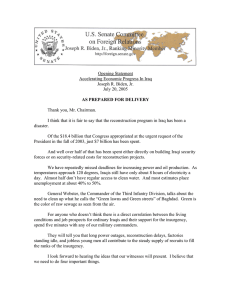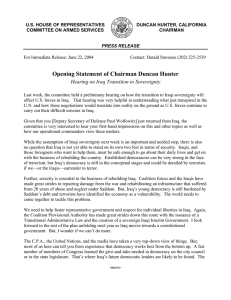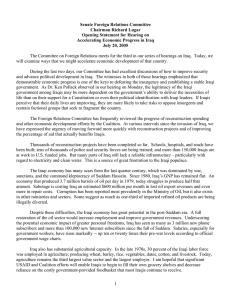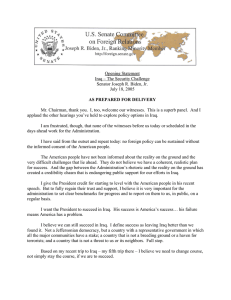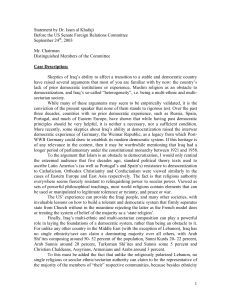STATEMENT OF RICHARD PERLE
advertisement
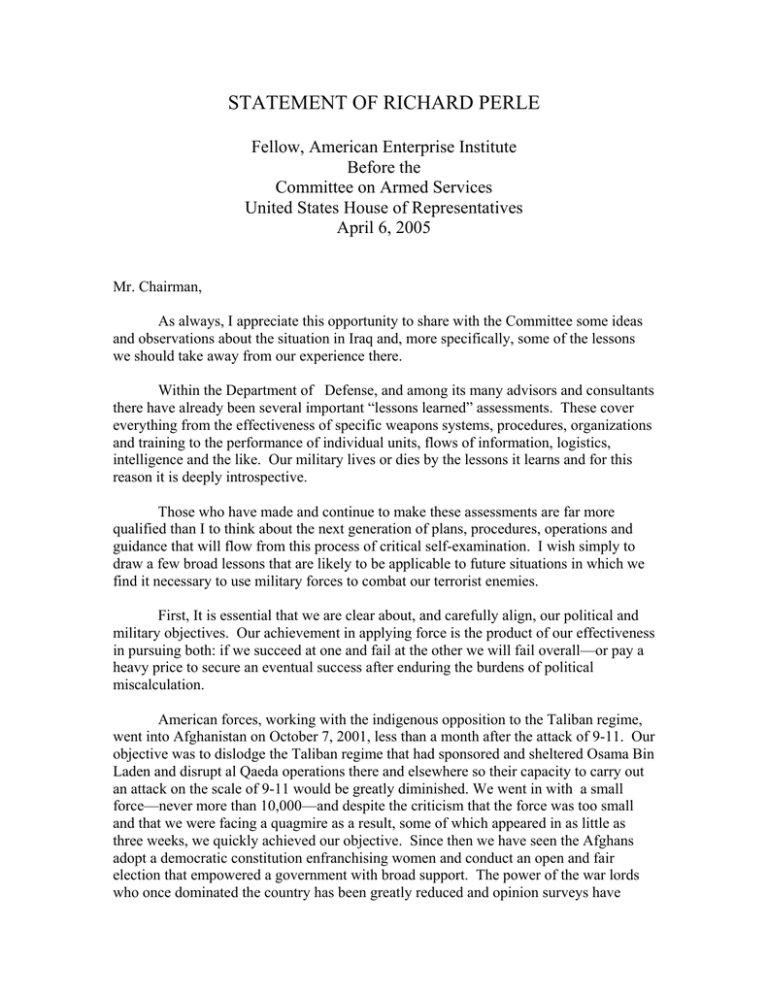
STATEMENT OF RICHARD PERLE Fellow, American Enterprise Institute Before the Committee on Armed Services United States House of Representatives April 6, 2005 Mr. Chairman, As always, I appreciate this opportunity to share with the Committee some ideas and observations about the situation in Iraq and, more specifically, some of the lessons we should take away from our experience there. Within the Department of Defense, and among its many advisors and consultants there have already been several important “lessons learned” assessments. These cover everything from the effectiveness of specific weapons systems, procedures, organizations and training to the performance of individual units, flows of information, logistics, intelligence and the like. Our military lives or dies by the lessons it learns and for this reason it is deeply introspective. Those who have made and continue to make these assessments are far more qualified than I to think about the next generation of plans, procedures, operations and guidance that will flow from this process of critical self-examination. I wish simply to draw a few broad lessons that are likely to be applicable to future situations in which we find it necessary to use military forces to combat our terrorist enemies. First, It is essential that we are clear about, and carefully align, our political and military objectives. Our achievement in applying force is the product of our effectiveness in pursuing both: if we succeed at one and fail at the other we will fail overall—or pay a heavy price to secure an eventual success after enduring the burdens of political miscalculation. American forces, working with the indigenous opposition to the Taliban regime, went into Afghanistan on October 7, 2001, less than a month after the attack of 9-11. Our objective was to dislodge the Taliban regime that had sponsored and sheltered Osama Bin Laden and disrupt al Qaeda operations there and elsewhere so their capacity to carry out an attack on the scale of 9-11 would be greatly diminished. We went in with a small force—never more than 10,000—and despite the criticism that the force was too small and that we were facing a quagmire as a result, some of which appeared in as little as three weeks, we quickly achieved our objective. Since then we have seen the Afghans adopt a democratic constitution enfranchising women and conduct an open and fair election that empowered a government with broad support. The power of the war lords who once dominated the country has been greatly reduced and opinion surveys have shown that the approval of U.S. forces in Afghanistan is now around the 70-80% level, a degree of approbation that most institutions can only dream of. In Iraq we succeeded in driving Saddam Hussein from office in three weeks. And while we were received in Iraq as liberators in the days following the collapse of Saddam’s army and regime, we did not enjoy the benefit of a close collaboration with the indigenous opposition to his brutal, sadistic dictatorship. This brings me to my second lesson: In aligning our political and military strategy, we should make sure we have the support of a significant segment of the local population. Even more, we should work with those whose interests parallel our own, taking them into our confidence and planning to operate in close collaboration with them. We did this in Afghanistan. But we did not do it in Iraq, despite the fact that we had a year to organize and prepare for hostilities that brought a hundred and thirty thousand Americans to a place they didn’t know or understand. Even during the three weeks of fighting leading to the fall of the regime, we would have benefited from knowledge we did not have: the location of weapons caches, the importance and implications of looting, the nature and extent of the retreat—and potential re-organization—of elements of Saddam’s regime, and the like. More significantly, we were slow to recognize how central the Iraqis were to the post-war stabilization of the situation on the ground. I believe we would have been wise to go into Iraq with several thousand Iraqis at our side. After all, the Congress, with the support of most and possibly all the members of this committee, approved the Iraq Liberation Act which authorized political, material and moral support for the Iraqi National Congress and other Iraqi opponents of Saddam’s regime. With thousands of Iraqis at our side, we might well have dealt more effectively with the turmoil and looting that followed the collapse of the regime and we might have jump started the transition to an emerging Iraqi democracy. But there was little support within the executive branch for implementing the Iraq Liberation Act, for taking the Iraqi opposition into our confidence, or for training Iraqis to fight alongside us. Central Command opposed serious, intelligent plans that could have provided thousands of Iraqi troops to help us evaluate the situation on the ground, interpret information about who was trustworthy, where hostile forces and weapons were hidden, otherwise to supply much-needed intelligence. The State Department and the CIA actively opposed working with the Iraqi opposition with the result that very little of the material support voted by Congress before the war was actually spent. By the time those favoring a much closer collaboration between U.S. and Iraqi opposition forces got agreement to begin training some Iraqis, for example, we were on the verge of war. Sadly, as we went to war only a handful of Iraqis had graduated from a much delayed training program that had vastly more potential than we were able to realize. The third lesson is, by now, generally accepted: our intelligence is sometimes, dangerously inadequate. That was certainly the case as we went into Iraq. The appalling incompetence at the CIA and elsewhere in the intelligence community left us largely ignorant of such basic information as the state of Iraq’s infrastructure (and therefore the pace at which basic services could be established when the fighting ceased) and the size, organization and tactics of elements of Saddam’s regime, which later emerged as the core of the insurgency. There is reason to believe that we were sucked into an ill-conceived initial attack aimed at Saddam himself by double agents planted by the regime. And as we now know the estimates of Saddam’s stockpile of weapons of mass destruction was substantially wrong. I wish I could share the optimism of those who have pushed through the “reforms” proposed by the 9-11 Commission that the structural changes enacted by the Congress will solve the problem. But I believe the problem will not be solved simply by reordering the broken parts of our intelligence establishment. Far more radical reform is required, but I see little prospect that it will occur. I have, on previous occasions urged this and other committees of the Congress to conduct a quiet retrospective analysis of the competence with which the intelligence community has rendered its analyses of the middle east region, and especially the Gulf, over the last 30 years. I believe such an analysis would show chronic failure: faulty estimates accompanied by smug confidence about future developments rendered in the face of repeated nasty surprises. Finally, Mr. Chairman, a fourth lesson: we must do everything possible to avoid becoming an occupying power. The occupation of Iraq did much to vitiate the good will we earned—and deserved—as brave Americans risked, and in all too many cases sacrificed, their lives to liberate Iraq. We should have turned Iraq over to the Iraqis on the day Baghdad fell—or as soon thereafter as possible. I believe it could have been done in a few weeks, not the many months, stretching to years, that led inexorably to the insurgency that has caused so much death and destruction. A quick hand-over would have given Iraqis an immediate stake in the establishment of order and a civil society. The Iraqis would have made some mistakes, of course. But we were not immune from mistakes—and ours were magnified many times over by our occupying presence. The grand ambition of the Coalition Provisional Authority was profoundly mistaken. The image on Iraqi television of an American pro-consul informing the Iraqi people of the rules we made for them and the arrangement of their lives for which we assumed responsibility, contributed significantly to the difficulties we have had in Iraq. With the best of intentions and hard and admirable work by thousands of American administrators in Iraq, we simply got it wrong. The Iraqi elections marked the end of the occupation and the beginning of what I am confident will be the successful transition to a decent, humane self-government by and for the people of Iraq. Having watched more than eight million Iraqis risk their lives to exercise the vote we so often take for granted, there is only one lesson we can draw: the courage of the Americans who come to free them has been matched by the Iraqis who we have freed. And great honor belongs to both.



